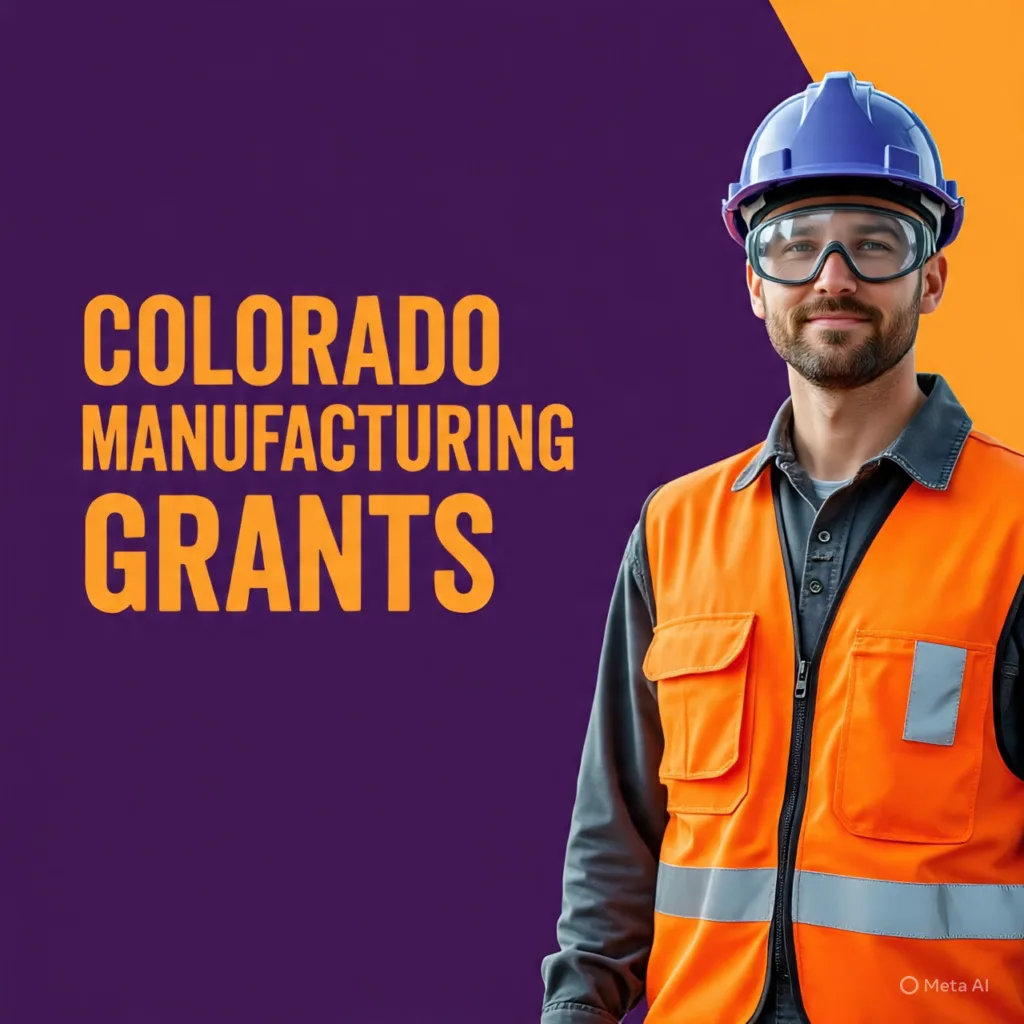Marshalls Good Stuff Accelerator Program – $5,000 Grant + Year-Long Virtual Mentorship for 40 Women
- Deadline : October 14, 2025
- Businesses, Individuals, Women

Colorado manufacturers get $10K consulting services for $2,500. Apply for Colorado manufacturing grants now – reviewed weekly!
Colorado manufacturing grants through the Small Manufacturing Recovery program provide a lifeline for rural manufacturers still dealing with pandemic aftershocks. Here’s something you probably didn’t know – Grantaura’s database shows that funding specifically targeted at rural manufacturing operations like this is pretty rare. Most grant programs focus on tech startups or urban businesses, leaving rural manufacturers to figure things out on their own.
This particular program flips that script completely. Manufacturer’s Edge is a statewide manufacturing assistance center, partially funded by the NIST Manufacturing Extension Partnership (MEP), and they’ve managed to secure state funding that covers 75% of professional consulting costs. That’s not typical – usually you’re looking at maybe 25-50% cost sharing on programs like this.
What makes this even more interesting is the timing. Most manufacturers I talk to are still dealing with supply chain issues that haven’t fully resolved, plus workforce shortages that make day-to-day operations challenging. The consulting services they’re offering directly address two of the biggest operational pain points: maintenance systems that are held together with duct tape and prayers, and business decisions being made without proper data visibility.
The program offers two specific consulting tracks, both valued at $10,000 in professional services. Companies pay $2,500, the grant covers the remaining $7,500. That’s substantial savings for rural businesses typically operating on tight margins.

Let me break down what these consulting options actually deliver, because the official descriptions are pretty generic.
The “Improving Operations: Maintenance Program Gap Assessment” is basically a complete overhaul assessment of how you maintain your equipment. A consultant spends two days on-site comparing your current practices to industry best practices. They evaluate your 5S implementation, preventive and predictive maintenance programs, work and materials management, computerized maintenance management systems usage, failure analysis capabilities, maintenance effectiveness measures, and overall equipment condition. You get a time-phased implementation plan at the end.
Most rural manufacturers I’ve encountered are running maintenance programs that evolved organically over years – fixing things when they break, keeping some basic preventive schedules, but nothing systematic. Professional maintenance consulting typically costs way more than $10,000, so getting this level of assessment for $2,500 is genuinely unusual.
The “Deciding with Data: Operational Metrics & Dashboard Creation” tackles the problem of running blind operationally. This project creates a customized dashboard that tracks key performance indicators specific to your operation. Instead of wondering whether quality issues are getting better or worse, or whether production efficiency is trending up or down, you get clear visibility into what’s actually happening. The final deliverable is an Excel-based dashboard system that simplifies daily, weekly, and monthly performance reviews.
Q: How competitive is the application process?
A: Applications are reviewed weekly with responses within 10 business days.
Q: Can I get both consulting services?
A: No, each company is limited to one service.
Q: What’s the real time commitment?
A: Projects typically run 5-6 months from approval to completion.
From the Eastern Plains to the Western Slope, 54 of Colorado’s 64 counties are non-metro and rural. That’s 84% of the state’s counties classified as rural, which means most manufacturers outside Denver-Boulder are operating in isolation from professional business services.
Urban manufacturers have access to consulting firms, business accelerators, industry networks, and professional development resources that rural operations simply don’t. When you’re running a manufacturing operation in Alamosa or Sterling or Grand Junction, finding qualified consultants who understand manufacturing operations isn’t easy. And when you do find them, the travel costs and project minimums make it financially prohibitive.
This grant program essentially brings Denver-level consulting expertise to rural manufacturing operations at a price point that makes sense. Small business grants like this that specifically target operational improvements are uncommon.
The pandemic impact requirement isn’t just bureaucratic checkbox – it reflects the reality that most rural manufacturers experienced significant disruption. Revenue decreases, increased costs, supply chain disruptions, workforce challenges. The application asks for specific percentages on these impacts, which means they’re trying to quantify the damage rather than just verify it happened.
The application process is more comprehensive than typical grant applications. They want basic company information, but also detailed business health assessments across multiple operational areas. Questions cover leadership structure, strategic planning processes, marketing and sales approaches, data usage patterns, workplace safety protocols, workforce management systems, and operational process standardization.
Q: What if my business is home-based?
A: Home-based businesses are explicitly excluded from this program.
Q: How do I document pandemic impacts?
A: The application asks for specific percentages on revenue decreases and expense increases.
Q: What happens after approval?
A: You receive an outline detailing timeline, provider, expected impacts, and deliverables.
The COVID impact section requires concrete numbers – percentage revenue decreases, percentage expense increases, employment impact data. This isn’t about dramatic stories; it’s about quantifiable business disruption. Most rural manufacturers should be able to document some level of impact given how widespread the disruptions were.
They also want projections for expected outcomes: job creation estimates, job retention numbers, new sales expectations, cost savings potential. This isn’t about making up optimistic projections – it’s about thinking through how operational improvements might translate to measurable business results.
Past participants in similar programs report operational improvements up to 15%. In manufacturing, that kind of improvement in key metrics often translates to significantly higher profitability. Better maintenance programs reduce unplanned downtime, which directly impacts production capacity. Better data visibility enables faster problem identification and resource allocation, which improves overall efficiency.
The 5-6 month timeline for project completion reflects the depth of engagement. This isn’t a quick consultation – it’s a substantial professional relationship with measurable deliverables and implementation support.
Current grant opportunities are restricted to rural manufacturers, which reflects both the funding source and the program’s mission. Manufacturer’s Edge received state funding that will offset a portion of the project’s total cost, specifically to serve rural manufacturing communities that typically lack access to professional consulting services.
This grant program exists within a broader ecosystem of Colorado manufacturing support initiatives. Nearly 6,000 manufacturers across a variety of business sectors are disrupting their industries with advancements in manufacturing technologies throughout Colorado, but most of that innovation and support infrastructure is concentrated in urban areas.
Manufacturer’s Edge encourages the strength and competitiveness of Colorado manufacturers through various programs, but the Small Manufacturing Recovery Grants specifically address the resource gap rural manufacturers face. Urban manufacturers can access consulting services, professional development programs, and business support resources that rural operations struggle to reach.
The program’s focus on operational improvements rather than research and development or market expansion reflects the practical challenges rural manufacturers face. Before you can grow or innovate, you need efficient operations and data-driven decision making. Individual business improvement grants like this target the foundational operational issues that constrain growth.
Applications require demonstrating that your business was impacted by the pandemic through decreased revenues, increased expenses, labor market shortages, supply chain impacts, adoption of safer operating procedures, creation of new sales channels, or periods of closure. Given how widespread these impacts were, most rural manufacturers should qualify on at least one criterion.
Q: Are there other similar programs available?
A: New grants become available regularly, but rural manufacturing-specific programs are rare.
Q: What makes an application more competitive?
A: Clear documentation of COVID impacts and specific operational improvement goals.
Q: How long does the application take to complete?
A: Approximately 15-20 minutes, but gather your financial data first.
The restriction to companies with 250 or fewer employees keeps the focus on small to medium-sized operations that typically lack internal resources for operational improvement initiatives. Larger manufacturers generally have internal continuous improvement programs and access to consulting resources.
For many rural manufacturers, $2,500 still represents a significant investment decision. But consider the alternative – hiring similar consulting expertise independently would cost the full $10,000 minimum, assuming you can find consultants with manufacturing experience willing to work in rural Colorado.
The operational improvements these consulting engagements typically deliver often pay for themselves within the first year through reduced downtime, improved efficiency, and better resource allocation. A 10-15% improvement in operational metrics isn’t unusual for manufacturers who haven’t had professional operational assessments.
The application deadline is rolling, with weekly reviews, which means you don’t have to wait for annual funding cycles. Applications submitted one week get reviewed the following week, with responses within 10 business days. That’s faster turnaround than most grant programs.
But here’s the thing – state funding for programs like this is typically limited and temporary. When the current funding allocation is exhausted, the program ends until new funding becomes available. Project-specific grants like this don’t usually get renewed automatically.
If you’re a rural Colorado manufacturer considering this program, the question isn’t whether you need operational improvements – most manufacturers do. The question is whether you’re ready to commit the time and matching funds to work with professional consultants on systematic improvements to your maintenance programs or data visibility systems.
Honestly, navigating grant applications and making strategic decisions about operational investments can be overwhelming when you’re already managing day-to-day manufacturing operations. If you’re looking at this opportunity and want professional guidance on positioning your application or developing a broader funding strategy for your manufacturing business, that’s exactly what Grantaura’s consultation services provide. We help manufacturers identify funding opportunities and develop competitive applications. CLICK HERE to get GRANT PROPOSAL WRITING help.
Donor: Manufacturer’s Edge (funded by State of Colorado)
Focus: Rural manufacturing, operational improvement, data analytics, maintenance systems, COVID recovery, small business consulting
Region: Rural Colorado counties
Eligibility:
– Small to medium-sized manufacturers only
– Located in rural Colorado counties
– 250 or fewer employees
– Demonstrated COVID-19 business impact through decreased revenues, increased expenses, or operational disruptions
– NOT home-based businesses
– Must provide $2,500 matching investment
Benefits:
– Professional Consulting Services: $10,000 value for $2,500 investment
– Maintenance Assessment: Complete evaluation and improvement plan for maintenance operations
– Data Dashboard: Custom operational metrics dashboard in Excel format
– Implementation Support: 5-6 month engagement with expert consultants
Deadline: Rolling application review (applications reviewed weekly)
Terms:
– Cost Share: Company pays $2,500, grant covers remaining $7,500 of consulting services
– Project Duration: 5-6 months average completion timeline
– One Grant Per Company: Each manufacturer limited to one consulting service to maximize program reach
– Rural Restriction: Currently limited to rural Colorado manufacturers only
– COVID Impact Documentation: Must demonstrate pandemic-related business disruption
Author: Imran Ahmad has worked with hundreds of rural manufacturers who struggle to access the same professional consulting resources that urban businesses take for granted. As the founder of Grantaura, I’ve seen how operational improvements that seem basic – like systematic maintenance programs or data-driven decision making – can transform manufacturing businesses that have been running on institutional knowledge and reactive problem-solving. The isolation many rural manufacturers experience, making critical operational decisions without expert guidance, is exactly why targeted programs like Colorado’s Small Manufacturing Recovery Grants represent such valuable opportunities. When professional expertise becomes accessible at a realistic price point, smart manufacturers recognize it as an investment in long-term competitiveness rather than just another business expense.
We are your trusted grant application partners. You can navigate the entire grant application process with our expert guidance through this simple 5-step process.
Fill out the "Apply for this grant" form with your information and grant requirements.
Our grant experts will assess your eligibility and notify you via email.
A dedicated grant expert will be assigned to discuss next steps for your application.
Our expert will help you complete and submit your application with all required materials.
The grant committee will make their decision and notify successful applicants.